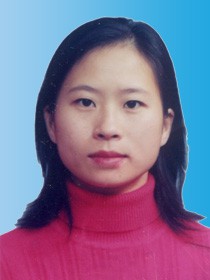戴 芳

2008-至今 兰州大学化学化工学院、功能有机分子化学国家重点实验室,副教授
2007-2008 兰州大学化学化工学院、功能有机分子化学国家重点实验室,讲师
2004-2006 兰州大学化学化工学院、功能有机分子化学国家重点实验室,博士后
2004 天津医科大学,博士学位
·研究兴趣
长期从事分子和细胞生物学相关研究工作,目前的研究兴趣集中于:(1)线粒体靶向的促氧化抗癌分子设计及其机制研究;(2)检测细胞氧化还原状态的荧光探针设计。
·代表成果
1. Cellular and Intravital Imaging of Nad(P)H by a Red-Emitting Quinolinium-Based Fluorescent Probe that Features a Shift of Its Product From Mitochondria to the Nucleus. De-Chen Duan, Junru Liu, Ya-Long Zheng, Hao Chen, Xinying Zhang, Yu Zhang, Fang Dai*, Shengxiang Zhang*, and Bo Zhou*, Anal. Chem., 2023, 95, 1335.
2. Fast Imaging of Mitochondrial Thioredoxin Reductase Using a Styrylpyridinium-Based Two-Photon Ratiometric Fluorescent Probe. Yong-Peng Yang†, Fu-Jian Qi†, Ya-Long Zheng, De-Chen Duan, Xia-Zhen Bao, Fang Dai*, Shengxiang Zhang*, and Bo Zhou*, Anal. Chem. 2022, 94, 4970.
3. Redox-Based Strategy for Selectively Inducing Energy Crisis Inside Cancer Cells: An Example of Modifying Dietary Curcumin to Target Mitochondria. Ya-Long Zheng, Zhi-Shan Tu, Hong-Mei Cui, Shuai Yan, De-Chen Duan, Wei Tang, Fang Dai*, and Bo Zhou*, J. Agric. Food Chem. 2022, 70, 2898.
4. Developing a Styrylpyridinium-Based Fluorescent Probe with Excellent Sensitivity for Visualizing Basal H2S Levels in Mitochondria. Bin Ma, Di-Hua Tian, Shuai Yan, Xiao-Chun Li, Fang Dai*, Bo Zhou*, Sens. Actuators B. Chem. 2021, 327, 128937.
5. A Multi-Signal M-targetable Fluorescent Probe for Simultaneously Discriminating Cys/Hcy/H2S, GSH, and SO2 and Visualizing the Endogenous Generation of SO2 in Living Cells. Ya-Long Zheng, Zuo-Hu Chai, Wei Tang, Shuai Yan, Fang Dai*, Bo Zhou*, Sens. Actuators B. Chem. 2021, 330, 129343.
6. Developing Push-Pull Hydroxylphenylpolyenylpyridinium Chromophores as Ratiometric Two-Photon Fluorescent Probes for Cellular and Intravital Imaging of Mitochondrial NQO1. Yong-Peng Yang, Fu-Jian Qi, Yi-Ping Qian, Xia-Zhen Bao, Han-Chen Zhang, Bin Ma, Fang Dai*, Sheng-Xiang Zhang*, Bo Zhou*, Anal. Chem. 2021, 93, 2385-2393.
7. Cooperation of ESIPT and ICT Processes in the Designed 2-(2′-Hydroxyphenyl)benzothiazole Derivative: A Near-Infrared Two-Photon Fluorescent Probe with a Large Stokes Shift for the Detection of Cysteine and Its Application in Biological Environments, Ying Long, Junru Liu, Dihua Tian, Fang Dai*, Shengxiang Zhang,* and Bo Zhou*. Anal. Chem. 2020, 92, 14236-14243.
8. Applying an Electrophilicity-Based Strategy to Develop a Novel Nrf2 Activator Inspired from Dietary [6]-Shogaol, Yuting Du, Yalong Zheng, Yuan Ji, Fang Dai*, Yongjing Hu, and Bo Zhou*. J. Agr. Food Chem. 2018, 66, 7983-7994.
9. Structural basis, chemical driving forces and biological implications of flavones as Cu(II) ionophores. FangDai, Wenjing Yan, Yuting Du, Xiazhen Bao, Xiuzhuang Li, and Bo Zhou*. Free Radical Bio. Med. 2017, 108, 554-563.
10. Design, synthesis, and evaluation of curcumin derivatives as Nrf2 activators and cytoprotectors against oxidative death. Zhishan Tu, Qi Wang, Dandan Sun, Fang Dai*, and Bo Zhou*. Eur. J. Med. Chem. 2017, 134, 72-85.
11. Insights into the importance for designing curcumin-inspired anticancer agents by a prooxidant strategy: The case of diarylpentanoids. Fang Dai, Guoyun Liu, Yan Li, Wenjing Yan, Qi Wang, Jie Yang, Dongliang Lu, Dejun Ding, Dong Lin, and Bo Zhou*. Free Radical Bio. Med. 2015, 85, 127-137.
12. Toward an understanding of the role of a catechol moiety in cancer chemoprevention: The case of copper- and o-quinone-dependent Nrf2 activation by a catechol-type resveratrol analog. Dong Lin, Fang Dai, Landi Sun, and Bo Zhou*. Mol. Nutr. Food Res. 2015, 59, 2395-2406.
13. 3, 4-dimethoxystilbene, a resveratrol derivative with anti-angiogenic effect, induces both macroautophagy and apoptosis in endothelial cells. Lu Zhang, Hongjuan Jing, Liuqing Cui, Huanqing Li, Bo Zhou, GuangZhou Zhou, and Fang Dai*. J.Cell Biochem. 2013, 114, 697-707.
14. Antioxidative Effects of Curcumin and its Analogues against the Free-radical-induced Peroxidation of Linoleic Acid in Micelles. Fang Dai, Weifeng Chen, Bo Zhou*, Li Yang, Zhongli Liu. Phytother. Res. 2009, 23, 1220-1228.
15. Antioxidant synergism of green tea polyphenols with α-tocopherol and L-ascorbic acid in SDS micelles. Fang Dai, Weifeng Chen, and Bo Zhou*. Biochimie 2008, 90, 1499-1505.
